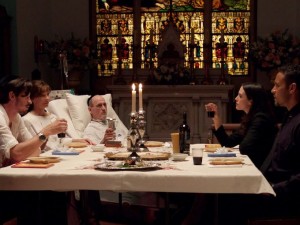Tuesdays in September on Turner Classic Movies: The Jewish Experience on Film
Posted on September 1, 2014 at 9:21 pm
This month, TCM has an excellent series of films about the Jewish experience, every Tuesday.
TCM proudly presents The Projected Image: The Jewish Experience on Film, a weekly showcase of movies focusing on Jewish history and heritage as portrayed onscreen. Co-hosting the films each Tuesday is Dr. Eric Goldman, an expert on Yiddish, Israeli and Jewish cinema, and founder and president of Ergo Media, a video publishing company specializing in Jewish and Israeli video. Goldman is also the author of The American Jewish Story Through Cinema (2013) and Visions, Images and Dreams: Yiddish Film Past and Present (2011).
The screenings are divided into themes, which air each Tuesday beginning on September 2 at 8pm with The Evolving Jew, featuring two versions of The Jazz Singer, the story of a young American performer who defies the traditions of his devout Jewish family. Al Jolson starred in the revolutionary early sound version from 1927, and Danny Thomas took over the role in the lesser-known 1953 remake. That same night, The Immigrant Experience focuses on Joan Micklin Silver’s Hester Street (1965) and Barry Levinson’s Avalon (1990), telling of Jewish families from Europe and Russia who settle in, respectively, the Lower East Side of New York City and a neighborhood in Baltimore, Maryland.
Among films dealing with The Holocaust on September 9 are two powerful classics from the 1960s: Stanley Kramer’s all-star Judgment at Nuremberg (1961), about the trial of war criminals in 1945-46; and Sidney LumetÕs The Pawnbroker (1965), starring Rod Steiger as a concentration-camp survivor. Also screening are Orson Welles’ The Stranger (1946), in which he plays a Nazi fugitive, and Edward Dmytryk’s The Juggler (1953), with Kirk Douglas as a Holocaust survivor.
September 16 sees Israeli Classics including two TCM premieres, Thorold Dickinson’s Hill 24 Doesn’t Answer (1955), the first feature film produced in Israel; and Ephraim Kishon’s Sallah (1964), a satire that became the most successful film in Israeli history. Also showing are a pair of films focusing on The Jewish Homeland: George Sherman’s A Sword in the Desert (1949, TCM premiere), which deals with the immigration into Mandatory Palestine during the mid-1940s; and Otto Preminger’s Exodus (1960), which concerns the founding of the state of Israel in 1948.
Tackling Prejudice on September 23 are three absorbing films based on novels about anti-Semitism: Laura Z. Hobson’s GentlemanÕs Agreement (1947); Crossfire (1947), based on John Paxton’s 1945 novel The Brick Foxhole; and Arthur Miller’s Focus (2001, TCM premiere). A fourth film, The House of Rothschild (1934), was taken from George Hembert Westley’s play about the celebrated Jewish banking family and its struggles for dignity and equality in the European financial world.
Among Coming-of-Age stories on September 30 are The Young Lions (1958), with Montgomery Clift as a soldier coming to grips with anti-Semitism during World War II; The Way We Were (1973) with Barbra Streisand as a Marxist Jew who shares a bittersweet romance with a handsome Gentile (Robert Redford); and Hearts of the West (1975), with Jeff Bridges and Alan Arkin in a comedy about a young writer who stumbles into a career as a cowboy star.


